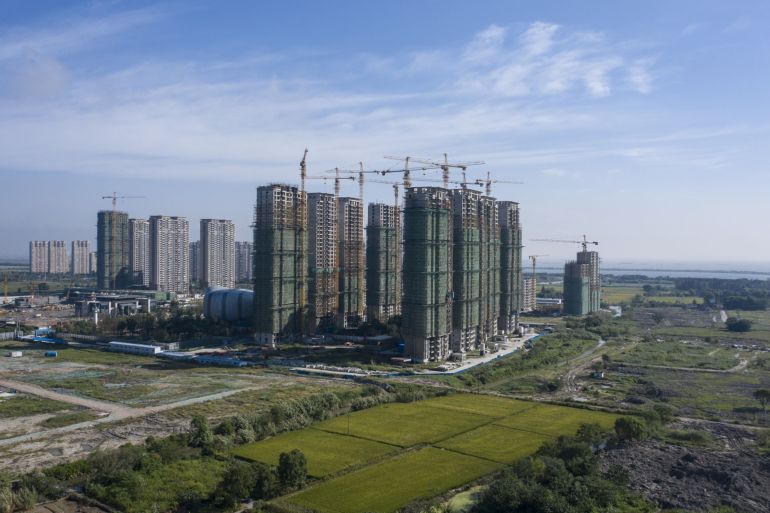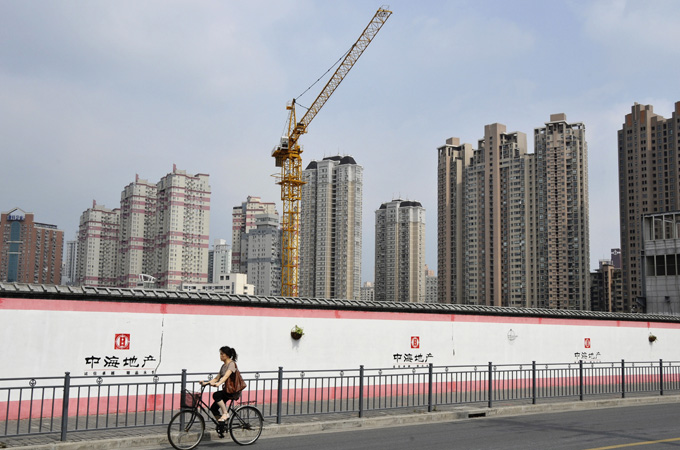Evergrande default signals volatility but no crash, analysts say
Analysts see China’s real estate market entering a period of stress but Beijing moving to contain fallout.

The defaults of Evergrande and Kaisa – two of China’s largest property developers – signal a prolonged period of volatility for China’s indebted real estate market, but analysts expect that Beijing will contain the damage.
Fitch Ratings on Thursday declared Evergrande in restricted default after it failed to repay its overseas bondholders 82.5m in interest payments that were due earlier in the week. Fitch also declared Kaisa Group Holdings in restricted default after it failed to repay a $400m bond that matured on Tuesday.
Keep reading
list of 4 itemsJapan’s economy shrinks faster than expected in Q3
In Thailand, Myanmar exodus a lifeline for COVID-battered economy
Can the global economy battle through another COVID-19 setback?
Shehzad Qazi, managing director of China Beige Book International, told Al Jazeera China’s real estate sector would face “stress for the foreseeable future” but a broader market crisis appeared to be unlikely.
“Beijing is attempting to shield the broader property sector from the Evergrande implosion,” Qazi said.
Henry Chin, head of research for the Asia-Pacific CBRE, told Al Jazeera he expected a “controlled landing” even as Beijing pushed ahead with its campaign to lessen the economy’s reliance on real estate.
“The Chinese central government will likely remain committed to its policy stance that ‘housing is for living in, not for speculation’, and the ‘three red lines’ continue to curb excess speculation and over-leveraging in the sector,” Chin said.
“As a result, market volatility should continue to persist with more defaults still to come – the peak of corporate real estate debt maturity is in 2022, with $55bn in debt set to mature. But we’re likely to see a controlled landing and regulators have recently issued more easing signals to meet reasonable financing needs in the real estate sector.”
Chin said Beijing’s measures to avoid a crash landing included “expressed support for bond issuance by developers to fund merger and acquisition activity, capital raising by less-leveraged developers via corporate bonds to repay maturing offshore debt, and a relaxation of home purchase policies to include upgrading demand”.

Janz Chiang, an analyst at Trivium China in Beijing, said it remained a priority for authorities to ensure the construction of new homes continued.
“Things are about to get messier for Evergrande as it formally defaults and cross-default clauses are triggered on its other debts,” Chiang said.
“As shown in the makeup of Evergrande’s recently established risk management committee, the state will play a more prominent role in finding solutions to Evergrande’s problems and formulating an acceptable restructuring plan. A bailout remains out of the question, but state firms would likely act as strategic investors or buy up some of Evergrande’s projects to ensure that units get delivered.”
China’s real estate sector accounts for more than a quarter of the country’s economic activity, but since August 2020, Beijing’s “three red lines” lending restrictions have squeezed over-leveraged private developers, such as Evergrande, pushing them close to bankruptcy.
Evergrande, which has outstanding offshore bonds worth $19bn, and Kaisa, which has offshore debt worth $12bn, are just two among a growing number of Chinese developers that are engulfed in China’s liquidity crisis. Analysts have predicted more defaults at other Chinese property developers are likely in the near future.
Evergrande has liabilities exceeding $300bn, leading some observers to fear a default could collapse the Chinese property market and the country’s economy. Beijing has moved to ring-fence Evergrande and set up a risk management committee to manage a restructuring of the company to prevent a crash.
Evergrande, one of China’s largest firms, missed a series of interest payments from September, but avoided default until this week by transferring the funds before the end of the 30-day grace period.
CBRE’s Chin said China’s era of residential real estate-led growth could be over as commercial property becomes a bigger driver of economic expansion.
“Thanks to the government’s commitment towards an innovation-driven economy in the medium to long-term, the commercial real estate market is maturing rapidly in areas such as logistics properties, data centres, and life sciences facilities,” he said. “We remain optimistic on China’s commercial real estate sector as an engine of growth, backed by underlying drivers such as urbanisation and middle-class growth.”
‘Weaker growth’
Evergrande’s default is likely to have a ripple effect on other markets and economies. Australia, one of China’s biggest trading partners, has already seen a steep drop in iron ore prices as construction slows down in the Chinese market.
“The China property market slowdown will translate to weaker growth for the economy as a whole,” Qazi said. “Metals and energy commodities producers will feel the pinch first both at home and abroad. But this will extend to a variety of industries, ranging from machinery and industrial metals manufacturing to furniture and appliance wholesalers and retailers.”
Qazi said the opaque nature of China’s economy and questionable accuracy of official statistics would make it difficult to track conditions going forward.
“The only way to understand how Beijing is managing the property market restructuring is to track how businesses are performing — if they’re accessing credit, and if that credit is going into productive uses,” he said.